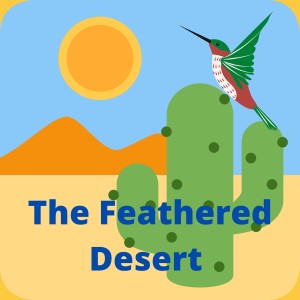
10.5K
Downloads
144
Episodes
Backyard bird feeding is one of the most enjoyable and rewarding hobbies on earth. Join Cheryl and Kiersten as they talk all about bird feeding in the desert Southwest area of the United States. They talk birds, seed, feeders, and dealing with those pesky unwanted visitors!
Episodes

Monday Jan 29, 2024
What’s in a Name
Monday Jan 29, 2024
Monday Jan 29, 2024
Summary: Bird names are changing in 2024. Join Kiersten and Cheryl as they talk about a controversial decision made about bird names.
For our hearing-impaired listeners, a transcript of this podcast follows the show notes on Podbean.
Show Notes:
“American Ornithological Society Will Change the English Names of Bird Species Named After People,” AOS Leadrership, https://americanornithology.org
“These American birds and dozens more will be renamed, to remove human monikers,” by Nell Greenfield-Boyce. NPR Morning Edition, November 1, 2023.
Transcript
Kiersten: Intro: Quoting the bard, William Shakespeare “A rose by any other name would smell as sweet.” I hope all you birders out there believe this quote to be true, because some changes are a’comin where common bird names are concerned. The American Ornithological Society has decided to change the English names of bird species named after people.
Cheryl: In November of 2023 the AOS announced that birds named after people would be renamed. Birds such as Anna’s Hummingbird, Bullock’s Oriole, Abert’s Towhee, Gambel’s Quail and Bewick’s Wren will all be renamed. Scientists will form a multi-disciplinary committee that will seek public input when they begin renaming the birds. They will focus on birds that are in the AOS’s jurisdiction which is the United States and Canada. Beginning in 2024, they will start with 70 to 80 species.
Kiersten: Why are they doing this? Quoting Dr. Collen Handel, president of the American Ornithological Society and a research wildlife biologist with the U.S. Geological Survey in Alaska, “There is power in a name, and some English bird names have associations with the past that continue to be exclusionary and harmful today. We need a much more inclusive and engaging scientific process that focusses attention on the unique features and beauty of the birds themselves.”
For example, in 2020 McGown’s Longspur, a small prairie songbird from the Great Plains, was renamed to the thick-billed Longspur. This name focuses on the characteristics of the bird instead of using the birds to honor a human being. I like this thought process. This is what the scientists are going to do with all those names.
Cheryl: By doing this, the AOS is admitting that the previous process for naming birds comtained some bias. There are three guidelines they will be using for the renaming process and for future newly discovered bird species.
- The AOS commits to changing all English-language names of birds within its geographic jurisdiction that are named directly after people, along with other names deemed offensive and exclusionary, focusing first on those species that occur primarily within the U.S. or Canada.
Kiersten: The second guideline:
- The AOS commits to establishing a new committee to oversee the assignment of all English common names for species within the AOS’s jurisdiction: this committee will broaden participation by including a diverse representation of individuals with expertise in the social sciences, communications, ornithology, and taxonomy.
Within the scientific community, AOS will include a broader representation of scientists this go around, instead of just a bunch of old white guys.
Cheryl: The third guideline:
- The AOS commits to actively involving the public in the process of selecting new English bird names.
So, instead of just involving scientists on the naming process, the AOS will reach out to the communities where these birds are found as ask for comments and suggestions.
Kiersten: Quoting Dr. Judith Scarl, AOS Executive Director and CEO, “As scientists, we work to eliminate bias in science. But there has been historic bias in how birds are named, and who might have a bird named in their honor. Exclusionary naming conventions developed in the 1800s, clouded by racism and misogyny, don’t work for us today, and the time has come for us to transform this process and redirect the focus to the birds, where it belongs.”
Cheryl: We know that there will be a lot of push back from birders who have been birding for many years, but this is a necessary step to opening up birding to everyone. Because birding is for everyone. Ken Kaufman, author of many widely used bird ID guides, weighed in on this decision in a recent NPR article. He’s been using these names for the last 60 years and was initially upset by the decision because he knows some of the people these birds are named after, but he’s come around to the idea. He was quoted as saying, “It’s an exciting opportunity to give these birds names that celebrate them, rather than some person in the past.”
Kiersten: I think Ken’s quote about sums it up. Remember that the only thing changing here is the name of the bird, they are still as beautiful and as fun to watch regardless of what call them.

No comments yet. Be the first to say something!